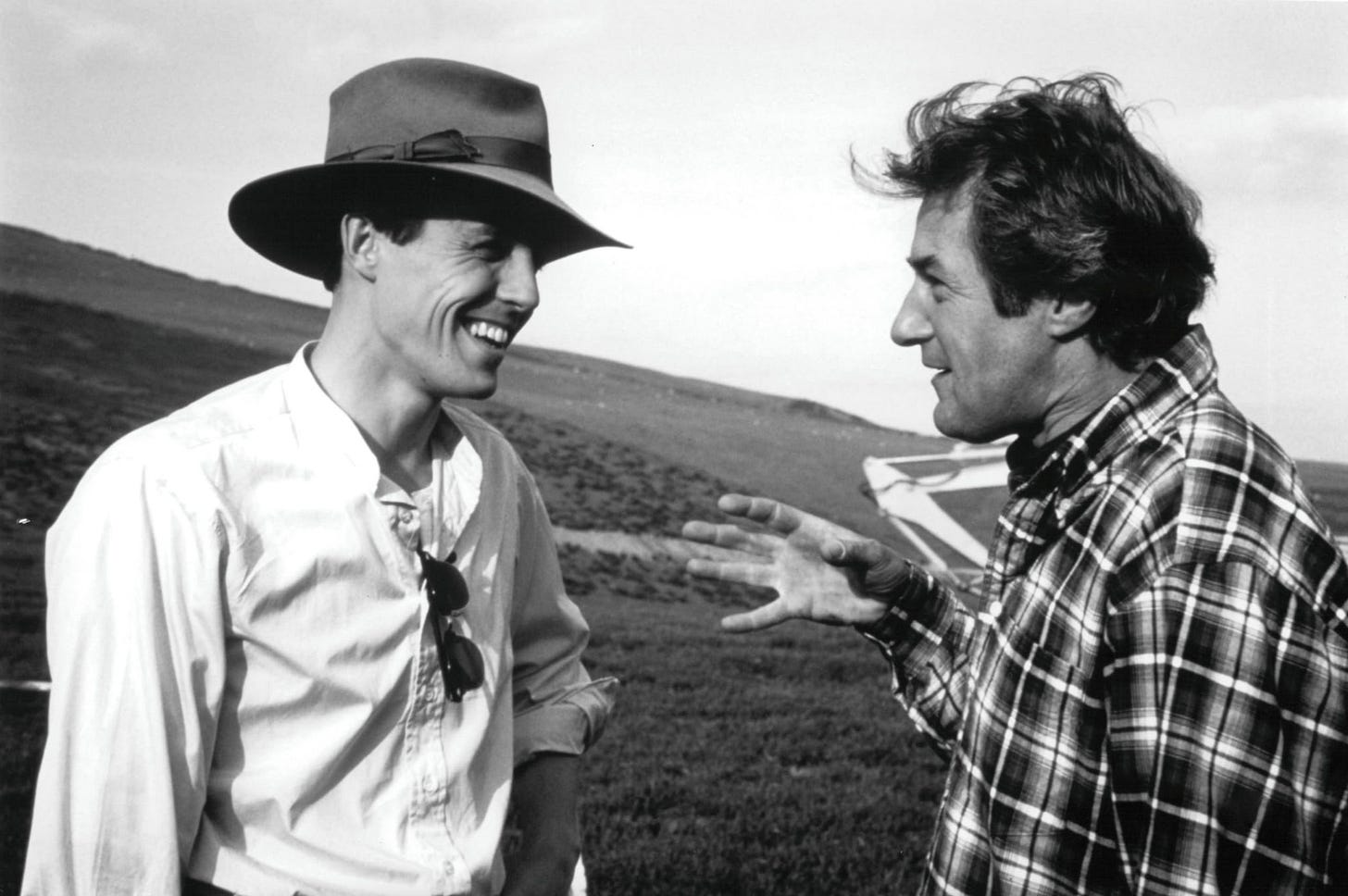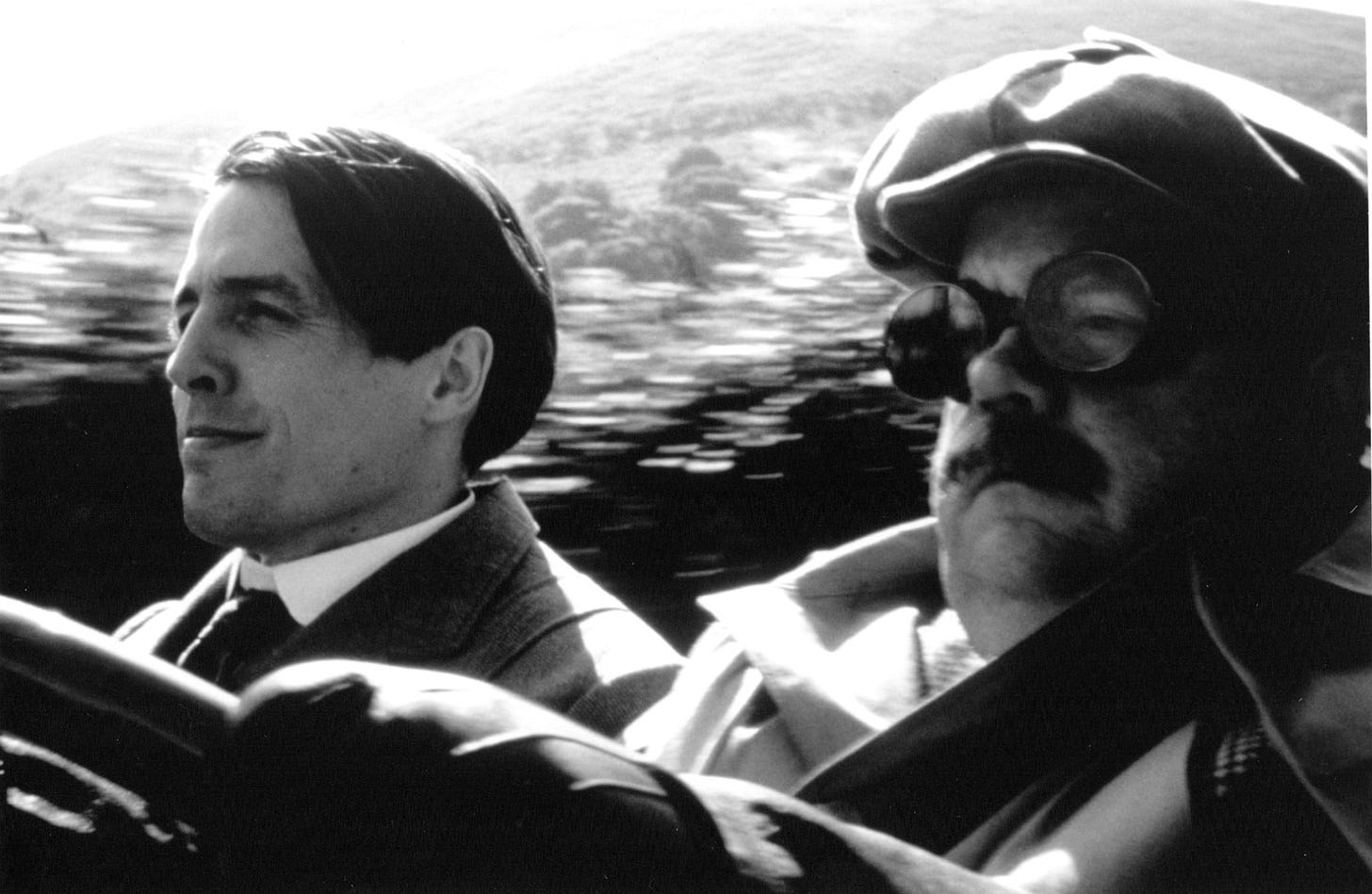Film Review: 'The Englishman Who Went Up a Hill But Came Down a Mountain' (1995)
How has this Hugh Grant-starring film about a Welsh village and its resourceful residents held up on its 30th anniversary?
2025 celebrates the 30th anniversary of director Christopher Monger’s low-key Welsh-infused comedy The Englishman Who Went Up a Hill But Came Down a Mountain. While I don’t presume to be the expert on the impact this film had/has, as an outside observer I’m offering an opinion on how the narrative has stood up since it first appeared in cinemas on 12 May U.S. (4 August UK), 1995.
Firstly, bear in mind two things: this was prime swoon-worthiness Hugh Grant: he of floppy hair, buttercup eyes, and the height of sexy stammer-mania. Secondly, Grant had a mind-blowing five releases that year in addition to The Englishman: Restoration, Sense and Sensibility, Nine Months, and An Awfully Big Adventure. Each had its tone and cadence, and its skew on Grant-appeal, which was indicative of his range and pull at the box office.
The Englishman slides into a middle slot, presented as an “it-means-well-nostalgic-novella” but with a slight whiff of “past-its-expiration-date” aroma. Co-produced and distributed by Miramax Films, it gave the movie an air of indie-cred without having to fight for butts in the seats during the summer blockbuster season, i.e. Casper, Die Hard With a Vengeance, Braveheart et al.
Hugh Grant and director Christopher Monger at The Garth (Mynydd y Garth) filming location, circa 1994.
Having said all that, what exactly is the premise? The visuals would have the moviegoer believe this was some sort of rom-com, with the pronounced puckered lips of co-star Tara Fitzgerald and the silhouette of the couple embracing, splashed on all the marketing material. But I’d be hard-pressed to give Fitzgerald even halfway billing when the thrust of the story is, in essence, a folk tale — something that the Welsh do so well. Not that I haven’t mentioned The Englishman elsewhere…
The film is narrated by an old man, relating a fable to his grandson, based loosely on writer-director Monger’s childhood recollections by his grandfather. The year is 1917 and two English ex-military/cartographers Reginald Anson (Grant) and George Garrad (Ian McNeice) have come to the fictional village of Ffynnon Garw, just north of Cardiff, to measure its “mountain.”
What ensues is the dogmatic persistence of the residents — with a slew of smoke-and-mirror bungling — ensuring that when presented with the fact that their mountain is 984 feet, just 16 feet short of accrediting the "hill" as a mountain at 1,000 feet (305 m), they will do everything to make it qualify and thus restore pride of place in a village which claims to have “the first mountain in Wales.”
Hugh Grant and Ian McNeice in The Englishman Who Went Up a Hill But Came Down a Mountain/©Miramax Films-Parallax Pictures
The real stars of the film are red-headed and hot-tempered Colm Meaney as tavern owner Malcolm the Goat and Kenneth Griffith as Reverend Robert Jones. What’s bothersome about Meaney’s characterization is — apart from the hysterical implication that while a majority of the men are away at war, the young children are ginger-haired, thereby implying lustful virility — the actor is Irish.
Firmly entrenched in the Star Trek canon as Chief Miles O’Brien, I can only surmise he was a recognizable and bankable name. His portrayal is heartfelt and boisterous and his compassion for the townspeople is without question, but perhaps I’m too closely tied to his diplomatic and calmer galactic tone. Griffith, however, is a native Welshman and at 74 years old, he was on brand playing the ferocious, passionate vicar, with a side of quirkiness that befits the tall-telling. He had been previously cast with Grant in Four Weddings and a Funeral and here provides the fiery oration required for the task at hand.
Town Meeting SCENE - The Englishman Who Went Up a Hill But Came Down a Mountain MOVIE (1995) - HD/©Miramax Films-Parallax Pictures/YouTube
Which brings us to Tara Fitzgerald. The sort of alleged cover-up of her real duties as “Betty from Cardiff” is just a side story for the do-nothing plot point of her and Anson finding common ground (excuse the pun) and her support (stop with the puns!), sharing a kiss at the end as the townsfolk rally around them, as it seals the official document’s calculation for the height of the mountain. Juxtaposed against her previous pairing with Grant in 1994’s Sirens, this coupling feels forced and flat.
I’ll refrain from delving any further with this needless diversion, except perhaps noting the intentions of a love angle for our ‘hero’ and his ‘damsel.’ I’m not trying to harsh your mallow. In all honesty, it only provides some embarrassing hair tousling from Grant which contributes zero to their on-screen chemistry.
Now onto the real reason we’re here: Wales. Aside from the quaint inference of the blustering English attitude versus the working-class Welsh backbone, my main concern was the cartoonish tone imposed on the Welsh townsfolk. The spirit of the narrative is admirable and the ability to showcase their fortitude in building up a mound of dirt to vanquish an injustice the Welsh see towards ‘the Crown’ is an avenue that has merit in real life.
Dafydd Iwan - Join YesCymru / Ymunwch â YesCymru/© Yes Cymru/YouTube
As a vehicle for a story that has its soul entwined in fiction, The Englishman Who Went Up a Hill But Came Down a Mountain can be viewed as pure entertainment with some stellar casting choices and cinematography that quite frankly, deserves a 4K upgrade. But steady yourself for a period piece that just skitted under the wire with the June 27, 1995 Grant-shenanigans.










I remember seeing this film when it was released and was really disappointed with it. May be time for a re-watch!
Haven't see this one. Must watch it, but I won't expect a romance angle now, just a lot of Welsh hijinx.